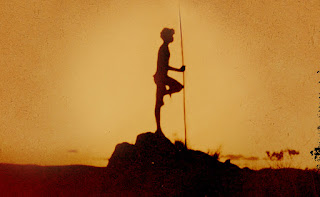walkabout
walkabout
 : an occasion in which an Australian Aborigine goes on a long walking journey on land that is far from towns and cities
: an occasion in which an Australian Aborigine goes on a long walking journey on land that is far from towns and cities
A Walkabout, as defined above by Merriam-Webster, has historical roots in the Aborigine society. Wikipedia expands on the definition by describing it as “a rite of passage during which male Australian Aborigines would undergo a journey during adolescence and live in the wilderness for a period as long as six months.” The characteristics – albeit requirements – are clear. It is an event, it is a solitary journey, it is significant and it is a milestone for moving from adolescence (youthfulness) to adulthood (clarity). It is also historically a journey in ‘male-hood’ – of masculinity.
The Urban Dictionary gives it a little different spin-
Background: Australian. Given to us by “Crocodile Dundee” (1986):
A spontaneous journey through the wilderness of one’s choosing in an effort to satisfy one’s itchy feet, a need to be elsewhere, the craving for the open road, that space over the horizon…yes… something like that… you can’t quite touch it so you have to go find it because it’s you just know it’s there…Or maybe it just feels good to go walking around … 😉 Yeah. It’s WALKABOUT.
Somewhere in-between Merriam-Webster, Wikipedia and the Urban Dictionary is what could be an important formula for each of us as we move through life and experience the inevitable and natural transitions that occur. Some of those we expect and look forward to: moving away from our parents, getting married, having children, buying a home, starting and ending careers, sending our children to college, watching our children get married, grandchildren and retirement. Others come to us as a result of our decisions, the decisions of others or perhaps just as ‘fate’ would have it. The unanticipated divorce, loss of a job, bankruptcy, health issue, loss of a spouse or child – all of which can cause us to pause and wonder.
Transition, by definition, is fluid. It is a place in-between where we were and where we want to be. You could argue that we are always in transition, moving through one day/week/year and navigating what was and reconciling it to what is next. However it is the times that cause us to pause, feel lost and uneasy, and where ‘clarity’ isn’t so easy to grasp that perhaps, a ‘walkabout’ could be useful.
Our worlds are complex and life is chaotic. We are busy managing all of it simultaneously, with our only respite often being the five to six hours we allow ourselves for sleep. Sometimes though there are events or even ‘seasons’ in our life that are more impacting, triggering emotions, distracting us from being our best selves or derailing our happiness. Our culture urges us to ‘push through’ it. We treat it as something to get over, to work through or to accept. And – sometimes we can…but for those times when it just seems a bit much…I would encourage contemplating a walkabout.
The Aborigines were visionary in the need to acknowledge that moving from being a boy to becoming a man is a significant transition. The walkabout doesn’t at all encompass the totality of that transition – but it is the place where thought, consideration and contemplation exist. The physical journey through the cities and the space to be alone and think allowed the young men to look at where they have been, immerse in and observe the world around them, contemplate what they have learned from their teachers and decide who they will be as men. It was a time to ‘just be’, to not have to worry about anyone else and to have the space away from distraction to make purposeful decisions about the future.
 The Urban Dictionary definition talks of ‘itchy-feet’ and eludes to a walkabout as an answer to restlessness. I would argue that there is a broader need for taking a ‘break’ from the chaos of life to contemplate and renew. A walkabout also doesn’t need to be a six-month journey to different cities and most certainly is not limited to a specific gender.
The Urban Dictionary definition talks of ‘itchy-feet’ and eludes to a walkabout as an answer to restlessness. I would argue that there is a broader need for taking a ‘break’ from the chaos of life to contemplate and renew. A walkabout also doesn’t need to be a six-month journey to different cities and most certainly is not limited to a specific gender.
A walkabout is just your version of stepping out of the madness and situation, acknowledging it as an event and using that ‘break’ to be solitary – taking the space and valuing yourself enough to take the time and energy to invest in you – to allow you to heal, grow, evolve and purposefully work through whatever transition you are experiencing. It could be a weekend at a spa, a Sunday evening yoga class, daily runs at dusk or dawn, an hour of mediation in the morning or a weekly hike on your favorite mountain. It could be committing to coaching or therapy. It could be an unspecified time away from family or a job. It could be a sabbatical.
The formula can vary but the criteria is clear – it is about you – it is a focused time to consider your current transition, it is an opportunity to think through the next steps, create a plan to gather the tools you will need or identify the people you need to connect with. It is an event (or a series of consistent events) that you do with a purpose of tapping into you – and your energy – to facilitate your transition.
If life is a bit much – if you are unsure, dealing with unexpected situations or are living in that place of overwhelmed… remember the Aborigine…I encourage a walkabout.
Shirley Ramos is a principal at Dirty Girls Consulting, with a deep understanding that life is ‘messy’. DGC is about real women with a story supporting and empowering other ‘real’ women to be the best that they can be. Women work differently, think differently, and it is up to us to develop this difference into our strength. We explore breaking free of traditional standards, accomplishing professional and personal goals to create an authentic, fully loved life. Read more Dirty Girl Consulting blogs here.


